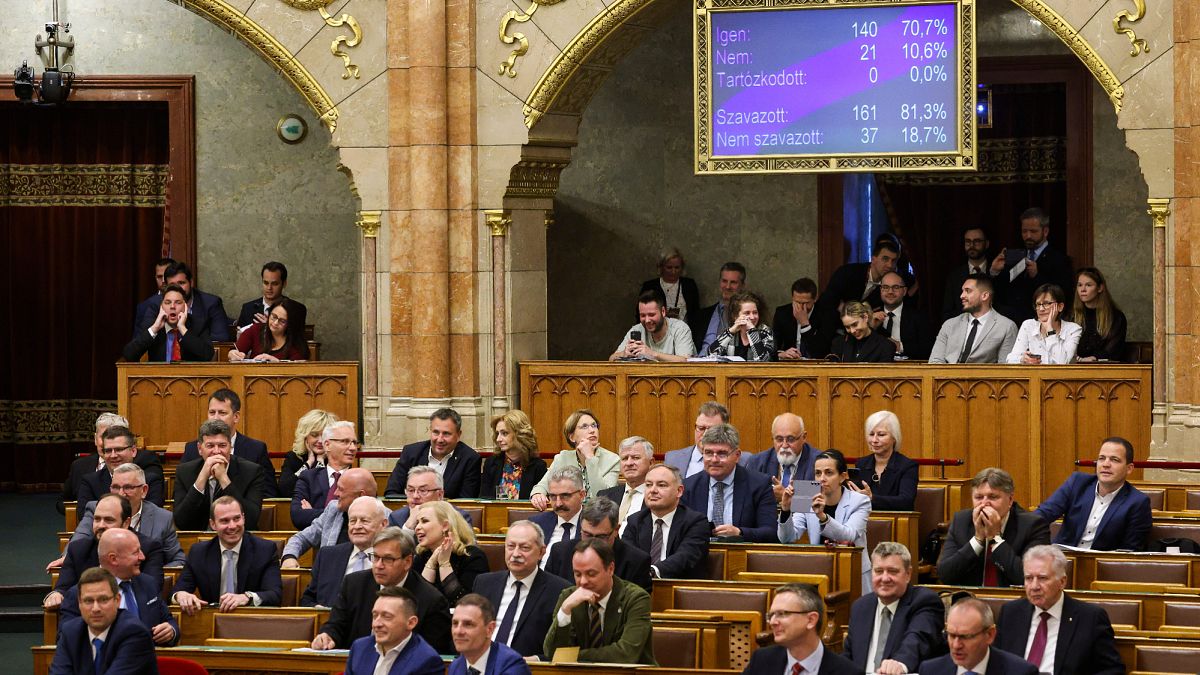Hungary’s parliament has passed an amendment to the constitution that allows the government to ban public events by LGBTQ+ communities, a decision that legal scholars and critics are calling another step toward authoritarianism.
The amendment, which required a two-thirds vote, passed along party lines with 140 votes for and 21 against.
It was proposed by the ruling Fidesz-KDNP coalition led by Prime Minister Viktor Orbán.
The amendment declares that children’s rights to moral, physical and spiritual development supersede any right other than the right to life, including the right to peacefully assemble.
The amendment codifies a law fast-tracked through parliament in March that bans public events held by LGBTQ+ communities, including the popular Pride event in Budapest that draws thousands of visitors annually.
That law also allows authorities to use facial recognition tools to identify people who attend prohibited events and can come with fines of up to 200,000 Hungarian forints (€481).



https://en.wikipedia.org/wiki/Charter_of_Fundamental_Rights_of_the_European_Union
Charter of Fundamental Rights of the European Union
https://fra.europa.eu/en/eu-charter/article/11-freedom-expression-and-information
I know that this isn’t identical to the First Amendment in the US. It doesn’t explicitly prohibit laws against assembling, for one:
https://en.wikipedia.org/wiki/First_Amendment_to_the_United_States_Constitution
And legal interpretations from cases won’t be the same. But there’s gotta be at least some argument that this runs afoul of the EU treaties and should be challenged under those.
The European Convention on Human Rights does explicitly prohibit restrictions on assembly, but it also explicitly has an exception if it’s to protect morals, which I assume is the grounds under which Hungary is acting in banning LGBTQ+ groups assembling:
https://en.wikipedia.org/wiki/Article_11_of_the_European_Convention_on_Human_Rights
Thanks for the extensive comment, but unfortunately the EU can’t take Hungary to court. They also ignored the ICC order to arrest Netanyahu. I know I sound very cynical by quoting this, but it seems a very true to me (and Orban) right now.
Laws without enforced consequences are merely suggestions.
Hmm. No? Isn’t that what the European Court of Human Rights is for, as to ECHR violations?
There are rulings against countries here:
https://en.wikipedia.org/wiki/List_of_European_Court_of_Human_Rights_judgments
For violations of the Charter of Fundamental Rights of the European Union, I’d think that the European Court of Justice would have jurisdiction, and I see rulings here:
https://en.wikipedia.org/wiki/List_of_European_Court_of_Justice_rulings
Like Commission v. Italy.
I’m not sure as to whether this affects things. I don’t think that this is a matter of law that the ICC deals with.
ICC members have ignored ICC arrest warrants before, so there’s some precedent; I remember that coming up with Putin.
And as far as I know, the ICC isn’t the court that would deal with EU treaty violations, yes? It’s not an EU institution or Council of Europe institution.
EDIT: And I see a list of LGBT cases here:
https://en.wikipedia.org/wiki/List_of_LGBTQ-related_cases_before_international_courts_and_quasi-judicial_bodies
That includes cases under the European Court of Human Rights and under the Court of Justice of the European Union (which the European Court of Justice is part of).
I don’t know much about legal systems so your comments and sources are nice, but I haven’t really seen the EU having much influence on Orban so far while I feel they have had problems with a lot of stuff he did.
Kick them out of the union.